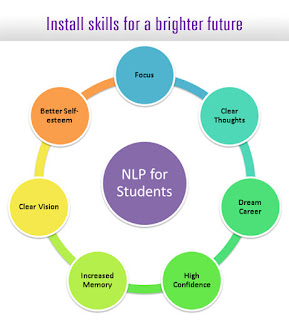NLP for Students
Neuro Linguistic Programming is the study for modelling excellence, where 'N' stands for Neuro : our first mental map of the world which is formed by our internal representations from our 5 senses namely visual, auditory, kinesthetic, olfactory & gustatory. 'L' stands for Linguistic where we form our second map of the world around us through our assigned language, even known as our Linguistic map. 'P' stands for Programming or our behavioural response towards the incidences that occur in our life due to the neurological filtering and our language map.
Neuro Linguistic Programming (NLP) is a tool for self-motivation and personal development. The teachers today have recognized that the principles of NLP are significantly parallel to Howard Gardner's 'Theory of Multiple Intelligences'.
We all have our 'representational systems' where we process sensory information. Many of us display a preference for one system even though we all have an ability to use all of them. Using all of them would even help a person to achieve the best results. Our 'representational systems' are similar to Gardner's Theory of Multiple Intelligences: Visual - where a student learns best through demonstrations, charts, or any type of visual stimuli; Auditory - where a student prefers a verbal explanation; & Kinesthetic where the student prefers to learn from a hands on experience. It is advised that every student should practice the techniques of NLP in order to get the desired result. And the teachers should try imparting knowledge in the learning style which a student learns or grasps the most be it visual, auditory or kinesthetic. We can easily identify the learning styles of a particular student through subtle clues and keen observation. Through this we gain an insight into the language & materials that a teacher utilises and thus be helpful in optimising their students' ability to imbibe the knowledge.
If used properly in education NLP has the potential to give various techniques that can be beneficial to our students and help them to use more than one learning style and even benefits the teachers by providing them with an additional tool to deal with challenging behaviour. There are many tests through which a student learns about his/her preferred learning style.
Apart from education NLP can be beneficial to teenagers who deal with anxiety, stress, lack of motivation/ confidence, phobias, any type of mental disorders, drug addiction, broken relations, insecurity, traumas, getting rid of past painful issues, depression and many more. The list is endless as NLP has many benefits & techniques that can help you in life and heal you by filling your life with positivity and inner bliss.
For queries regarding your preferred learning style or NLP you can contact me on my id - pratima.jay.shah@gmail.com.




Comments
Post a Comment